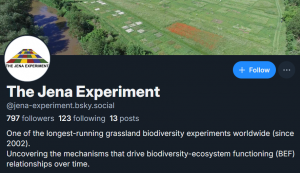New publication from Schmid et al. in Journal of Ecology: Effects of plant community history, soil legacy and plant diversity on soil microbial communities
Plant and soil microbial diversities are linked through a range of interactions, including the exchange of carbon and nutrients but also herbivory and pathogenic effects. Over time, associations between plant communities and their soil microbiota may strengthen and become more specific, resulting in stronger associations between plant and soil microbial diversity.

We tested this hypothesis at the end of a 4-year field experiment in 48 plots with different plant species compositions established 13 years earlier in a biodiversity experiment in Jena, Germany. We factorially crossed plant community history (old vs. new plant communities) and soil legacy (old vs. new soil) with plant diversity (species richness levels 1, 2, 4 and 8, each with 12 different species compositions). We use the term ‘plant community history’ to refer to the co-occurrence history of plants in different species compositions in the Jena Experiment. We determined soil bacterial and fungal community composition in terms of operational taxonomic units (OTUs) using 16S rRNA gene and ITS DNA sequencing.
Plant community history (old plants) did not affect overall soil community composition but differentially affected bacterial richness and abundances of specific bacterial taxa in association with specific plant species compositions. Soil legacy (old soil) markedly increased soil bacterial richness and evenness and decreased fungal evenness. Soil fungal richness increased with plant species richness, regardless of plant community history or soil legacy, with the strongest difference between plant monocultures and mixtures. Specific plant species compositions and functional groups were associated with specific bacterial and fungal community compositions. Grasses increased fungal richness and evenness and legumes decreased fungal evenness, but bacterial diversity was not affected.
Synthesis. Our findings indicate that as experimental ecosystems varying in plant diversity develop over time (2002–2010), plant species associate with specific soil microbial taxa. This can have long-lasting effects on below-ground community composition in re-assembled plant communities, as reflected in strong soil legacy signals still visible after 4 years (2011–2015). Effects of plant community history on soil communities are subtle and may take longer to fully develop.
Reference:
Schmid, M. W., van Moorsel, S. J., Hahl, T., De Luca, E., De Deyn, G. B., Wagg, C., Niklaus, P. A., & Schmid, B. (2021). Effects of plant community history, soil legacy and plant diversity on soil microbial communities. Journal of Ecology, 109, 3007– 3023. https://doi.org/10.1111/1365-2745.13714



